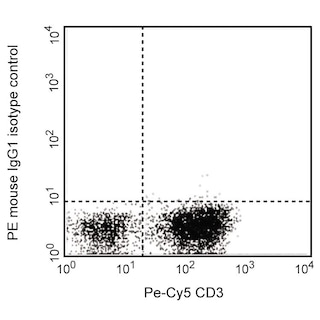-
Your selected country is
Middle East / Africa
- Change country/language
Old Browser
This page has been recently translated and is available in French now.
Looks like you're visiting us from {countryName}.
Would you like to stay on the current country site or be switched to your country?


.png)

Flow cytometric analysis of CD177 expression on human peripheral blood granulocytes. Whole blood was stained with either PE Mouse IgG1, κ Isotype Control (Cat. No. 554680; dashed line histogram) or PE Mouse Anti-Human CD177 antibody (Cat. No. 564239; solid line histogram). Erythrocytes were lysed with BD FACS Lysing Solution (Cat. No. 349202). The fluorescence histograms were derived from gated events with the forward and side light-scatter characteristics of intact granulocytes. Flow cytometric analysis was performed using a BD™ LSR II Flow Cytometer System.
.png)

BD Pharmingen™ PE Mouse Anti-Human CD177
.png)
Regulatory Status Legend
Any use of products other than the permitted use without the express written authorization of Becton, Dickinson and Company is strictly prohibited.
Preparation And Storage
Product Notices
- This reagent has been pre-diluted for use at the recommended Volume per Test. We typically use 1 × 10^6 cells in a 100-µl experimental sample (a test).
- An isotype control should be used at the same concentration as the antibody of interest.
- Caution: Sodium azide yields highly toxic hydrazoic acid under acidic conditions. Dilute azide compounds in running water before discarding to avoid accumulation of potentially explosive deposits in plumbing.
- Source of all serum proteins is from USDA inspected abattoirs located in the United States.
- For fluorochrome spectra and suitable instrument settings, please refer to our Multicolor Flow Cytometry web page at www.bdbiosciences.com/colors.
- Please refer to www.bdbiosciences.com/us/s/resources for technical protocols.
Companion Products





The MEM-166 monoclonal antibody specifically binds to CD177 which is also known as NB1 (Neutrophil-specific antigen), HNA-2a (Human neutrophil alloantigen 2a), and PRV1 (Polycythemia rubra vera 1). CD177 is a glycophosphatidylinositol (GPI)-anchored plasma membrane glycoprotein (56-64 kDa). CD177 is expressed on subpopulations of neutrophils, neutrophillic metamyelocytes and myelocytes from 89 to 97% of healthy individuals. It is also expressed on secondary granules. Its expression is upregulated on granulocytes stimulated with the chemotactic peptide f-met-leu-phe (fMLP). Although the function of CD177 has not been fully established, some reports suggest its possible role as receptor molecule involved in leucocyte migration.

Development References (7)
-
Clement LT, Lehmeyer JE, Gartland GL.. Identification of neutrophil subpopulations with monoclonal antibodies. Blood. 1983 February; 61(2):326-332. (Biology). View Reference
-
Kissel K, Santoso S, Hofmann C, Stroncek D, Bux J. Molecular basis of the neutrophil glycoprotein NB1 (CD177) involved in the pathogenesis of immune neutropenias and transfusion reactions. Eur J Immunol. 2001; 31(5):1301-1309. (Clone-specific: Western blot). View Reference
-
Matsuo K, Lin A, Procter JL, Clement L, Stroncek D. Variations in the expression of granulocyte antigen NB1. Transfusion. 2000 June; 40(6):654-662. (Biology). View Reference
-
Sachs UJ, Andrei-Selmer CL, Maniar A, et al. The neutrophil-specific antigen CD177 is a counter-receptor for platelet endothelial cell adhesion molecule-1 (CD31). J Biol Chem. 2007; 282(32):23603-23612. (Biology). View Reference
-
Stroncek D, Kissel K, Bux J. CD177: Neutrophil-specific antigen NB1. In: Mason D. David Mason .. et al., ed. Leucocyte typing VII : white cell differentiation antigens : proceedings of the Seventh International Workshop and Conference held in Harrogate, United Kingdom. Oxford: Oxford University Press; 2002:374-376.
-
Stroncek DF, Shankar R, Litz C, Clement L. The expression of the NB1 antigen on myeloid precursors and neutrophils from children and umbilical cords. Transfus Med. 1998 June; 8(2):119-123. (Biology). View Reference
-
Stroncek DF, Shankar RA, Noren PA, Herr GP, Clement LT. Analysis of the expression of NB1 antigen using two monoclonal antibodies. Transfusion. 1996 February; 36(2):168-174. (Biology). View Reference
Please refer to Support Documents for Quality Certificates
Global - Refer to manufacturer's instructions for use and related User Manuals and Technical data sheets before using this products as described
Comparisons, where applicable, are made against older BD Technology, manual methods or are general performance claims. Comparisons are not made against non-BD technologies, unless otherwise noted.
For Research Use Only. Not for use in diagnostic or therapeutic procedures.
Report a Site Issue
This form is intended to help us improve our website experience. For other support, please visit our Contact Us page.